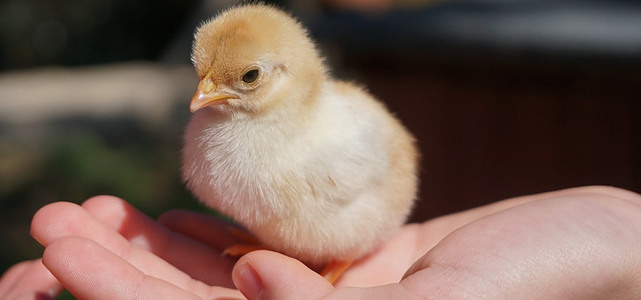Hey there, folks! Ever wonder how to make chicks friendly? Well, ponder no more. Whether you’re a newbie to backyard chicken farming or an old hand, we’re looking deep into the ABCs of turning your little chirpers into the nicest feathery friends on the block.
Why Is Chick Friendliness Important?
The Social Benefits
First things first, let’s chat about why you’d even want friendly chicks. In chicken society, harmony is like the best nesting box—everybody wants in. A peaceful pecking order ensures less stress, which ultimately means a happier, healthier, and more productive flock.
The Practical Benefits
On the human side of the coop, friendlier chicks are easier to handle—especially when it comes to health checks or moving them around. Plus, let’s be honest, who doesn’t want a flock that runs towards them instead of scattering like it’s Chicken Apocalypse?
Scared chickens are much more likely to become injured or worse. “Flying off the handle,” so to speak, is a sure way to injure a leg, lose some feathers, get hit by a car, or break a window.
Factors Affecting Chick Friendliness
Genetics
While we can’t play matchmaker with chicken genetics, know that some breeds are naturally more social than others. So, if you’re starting from scratch, maybe opt for the Buff Orpingtons over the aloof Leghorns.
Don’t get me wrong, though. Just because Leghorns might be inherently aloof, they are an outstanding addition to any flock because of their excellent egg-laying capacity.
Environment
A stress-free brooder setup means relaxed chicks. Relaxed chicks are more likely to be friendly chicks. Ensure they have ample space, warm bedding, and a balanced diet. Trust me, it sets the stage for friendliness.
Human Interaction
Ah, the role of the humble human—yep, that’s you! The more you interact in a calm and caring manner, the more likely those chicks will think you’re part of their pecking order—in a good way!
Just a quick reminder here… try not to handle chicks too early. During their first two days out of the shell, they should be allowed to sleep, and sleep some more. Then, you can gently play with them until, eventually, they welcome your approach.
Strategies for Making Chicks Friendly
Early Handling
Baby chicks are like sponges, soaking up experiences that shape their adult personalities. Start gentle handling from day two. Hold them briefly and softly to avoid any undue stress.
Before you know it, they will be climbing all over you. Hint – Keep tissues handy;)
Consistent Interaction
The secret sauce in the recipe for friendly chicks? Consistency. Make sure you’re regularly cooing, petting, and holding them. You’re their Big Chicken, and they look up to you.

Treat Training
A tidbit of food goes a long way in building trust. Start with easy-to-digest treats like scrambled eggs. It’s like giving them a taste of the good life, quite literally!
Socialization Techniques
Got some old-school hens who are already social butterflies? Let them mentor your little ones. Also, throw in some toys or shiny objects for them to explore. It’ll help them associate your presence with Fun Times.
Common Mistakes to Avoid
Overhandling
Just like people, chicks need their space. If they start avoiding you or seem stressed out, maybe dial it back a bit, eh?
Don’t be too concerned. In time, you will learn the chicks’ social cues.
Incorrect Handling
Picking them up by their head, wings, or legs is a no-no. Always gently scoop them up, supporting their bodies fully. Be careful with their tiny feet and legs. They need them for the scratch part of scratch and peck.
Wrong Treat Choices
Citrus and chocolate are on the chick’s list of forbidden foods. So are onions, garlic, apple seeds (contain arsenic), salt, and raw beans. Stick to safe options, like grains or veggies, to avoid any gastrointestinal drama.
Signs Your Efforts Are Paying Off
Behavioral Indicators
When those chicks start following you around, that’s your cue! It means they consider you part of their flock, not just the giant who refills the food bowl.
Vocal Indicators
Hear a soft ‘cluck-cluck’ or ‘purr’? That’s basically chicken for “I like you.”
FAQs about Making Chicks Friendly
Some quick-fire answers to your burning questions:
- Yes, older chicks can be trained to be friendly.
- Changes in behavior can be seen in as little as a week, depending on your efforts.
- Both hens and roosters can be socialized, but roosters might require a bit more caution due to their natural instincts.
Conclusion
Well, there you have it, folks! Your foolproof guide on how to make chicks friendly. Now, I’d love to hear your tales from the coop. Tried any of these techniques? Have any cluck-tastic tips of your own? Spill the feed in the comments!
Additional Resources
Look at The Chicken Whisperer’s Guide to Backyard Chickens for additional expert advice on chick behavior.

